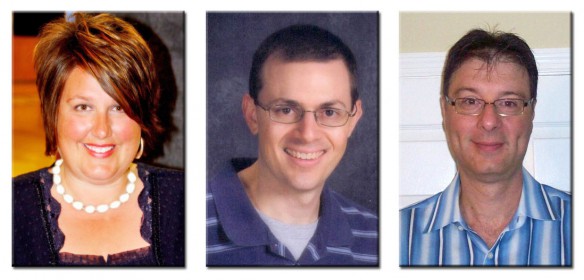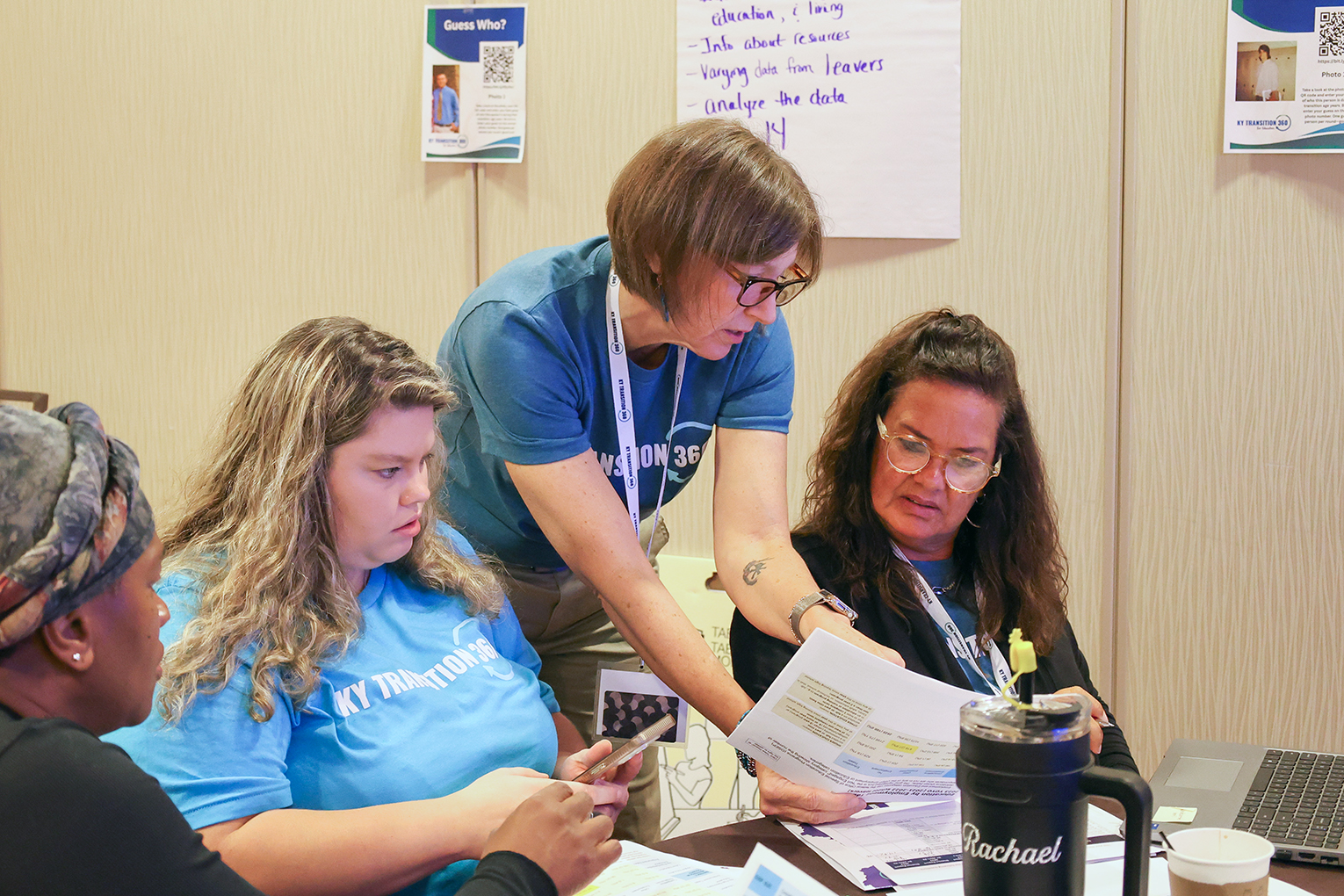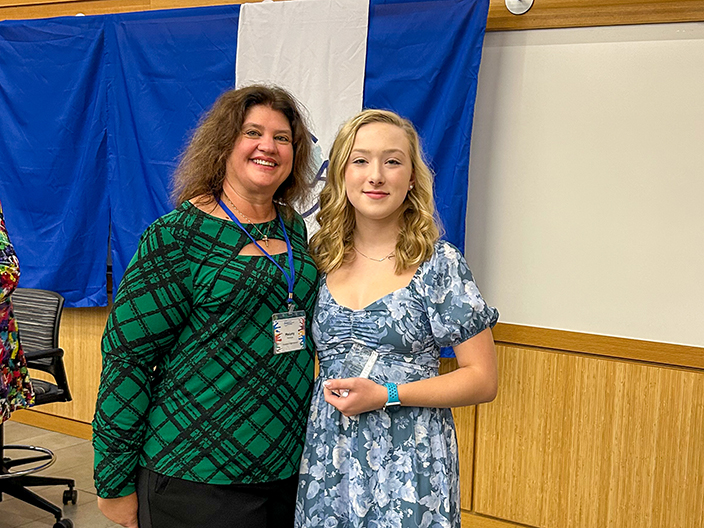
Johnson Central High School (Johnson County) AP English teacher Amiee Cantrell-Webb, Henderson County High School AP Calculus teacher Brian Sullivan and Bryan Station High School (Fayette County) AP Biology teacher Carlos Verdecchia have been named 2011 All American Teachers.
By Susan Riddell
Aimee Cantrell, Brian Sullivan and Carlos Verdecchia all entered the teaching profession for a variety of reasons, but they share a love of working with students and challenging them daily.
The three high school Advanced Placement (AP) teachers were recently honored as All-American Teachers of the Year by the National Math and Science Initiative, a national, non-profit organization focused on improving mathematics and science achievement.
These Kentucky teachers are among just 23 teachers nationwide recognized by NMSI for 2011.
Cantrell teaches English at Johnson Central High School (Johnson County). She has her Rank I and is the chair of the English Department for her school. Since becoming department chair, she has overseen the expansion of the Johnson Central High AP program so that it has Pre-AP I and II as well as AP language and literature classes.
Sullivan taught in Louisiana from 1997-2000, spent a year working at a Sylvan Learning Center in Evansville, Ind., and has been teaching mathematics, including AP calculus, at Henderson County High School since 2001. He is a National Board Certified Teacher.
Verdecchia has taught biology at Bryan Station High School (Fayette County) since 2000.
Here’s a closer look at the three teachers.
Why did you become a teacher?
Cantrell: My grandmother taught for 52 years. My father taught more than 30 years. Coming from a rural, impoverished area, I always understood why they loved what they did: They wanted to make positive impacts on students who didn’t always understand the value of education. That, too, was my calling. I go to school every single day knowing that I will work my hardest to make a difference and help these students realize that they can achieve success and go to college. I think a teacher’s job is the most important job, and I take the responsibility very seriously.
Sullivan: Since I was in high school I have always loved explaining things to people, and the harder, the better.
Verdecchia: I have always enjoyed the spark created in students who are obtaining new knowledge. I love to guide students through investigating questions and problem-solving exercises. But perhaps the main reason that I love teaching biology is because it is the coolest subject that attempts to explain the living world that we live in.
What aspect of the teaching profession are you most passionate about?
Cantrell: College readiness is my passion. Working in an area where college graduation rates are low, I know that the only way to help this area grow and thrive is to give our students the necessary tools to go to college (either a four-year university or technical college) so that they can graduate, be successful and hopefully come back and make Paintsville the best place to live in eastern Kentucky.
Sullivan: Kids. I love kids. I have seven of my own and one more on the way. I just have so much fun working with them. I wouldn’t want to do anything else.
Verdecchia: I’m passionate about trying new things that allow me to get the job done. I’m open-minded about new teaching techniques, approaches and activities. I love the non-monotonous pace that every day brings. I’m passionate about knowing my subject and preparing for my students.
What do you most like about teaching AP classes?
Cantrell: I love the students and seeing the growth throughout the year as they evolve from thinking the class is hard to understanding the skills and utilizing them in a very successful manner. I also love the challenge of making sure these students are prepared for college. I have thoroughly enjoyed AP open enrollment because it has given such a diverse and eclectic group of people the chance to come together and work toward a common goal: Gaining college credit and readiness.
Sullivan: I love pushing top kids to excel. I love helping them maximize their potential. I like being pushed by the smartest kids. It helps stimulate me and keeps me sharp.
Verdecchia: I like the challenge of AP. This class has made me a much better teacher in all my other classes because it requires me to improve my knowledge of biology to a much greater depth. The different trainings that I have attended have led me to meet some extraordinary teachers.
What have your students taught you?
Cantrell: My students have taught me that no matter the difficulty of the course, we must keep our sense of humor. AP classes sometimes get labeled as “too hard” or “no fun,” but these students have shown me that if I embrace it with enthusiasm, humor, some self-deprecation and sincerity, then they will face the challenge with those same characteristics. Learning this lesson early on has helped me and my students enjoy the class and embrace the challenge.
Sullivan: I learned that kids are capable of so much more than we sometimes give them credit for. I have been amazed at how many of my students have overcome so much adversity in their short lives and never quit striving to succeed.
Verdecchia: My students have taught me that their good experience in my classroom was not always about the science lessons; it is about the non-threatening environment that I created for my students. It is about the relationship I create with my students throughout their high school years. I’m always surprised and often reminded years later when I meet with students that were not stellar students, they have fond memories of my class or just remember my name. I’m reminded daily that what we educators consider the top priority for our student (passing a test or finishing a project) is often not the top priority of our student lives.
What three words describe your teaching style?
Cantrell: Thought-provoking, entertaining, flexible
Sullivan: Fun, conceptual, engaging
Verdecchia: Speak your mind.
What’s the best tool you’ve ever used in your classroom?
Cantrell: My newest favorite tool is the NMSI teacher resource website because it has AP prompts arranged by question type and year as well as great tutorial exercises. I love teaching using former AP prompts and knowing that I can access helpful tutorials with just a click of the mouse. I have all these resources for free because of our participation in the grant. It is simply fantastic.
Sullivan: Humor
Verdecchia: I love to talk about food. My doctorate degree is in Food Science, so I’m constantly making reference to food or processes that relate to food preparation. I enjoy seeing the reaction of my students when they find out how certain things are made and how those things can affect their body. Perhaps the most-used prop in my class is a model of a cell membrane phospholipid bilayer. My AP students always make fun of me or even count how many times I reach for the model in my class. This past school year, at the request of one of my best students, I built a totally edible model to celebrate the end of the year.
In what areas do Kentucky teachers as a whole still need to improve?
Cantrell: Speaking personally, I feel as though teachers often don’t understand the difference between rigor and just assigning a lot of work. Before attending multiple AP trainings, I often associated level of difficulty with how much work was assigned and how many books we could cram in; however, I have since learned that rigor comes from how much I challenge their minds in the confines of a 55-minute period instead of how much extra work they take home. It has been an amazing transformation for students in my classroom.
Sullivan: As a whole, I think it’s impossible to say. We all have so many things we can improve on, at least that’s how I feel about myself.
Verdecchia: I think as a whole, Kentucky teachers must raise their voice to our lawmakers so we are heard loud and clear when new laws concerning the academic achievement of our students are passed. More teachers must get involved in administrative positions so they can relate to the needs of this new century of teachers.
Where do you see Kentucky education in five, 10 years?
Cantrell: I really like the direction we are moving in Kentucky. I love the new standards, as I think they are streamlined and focused on skills, not content. If we meet the challenge and embrace the change, I think students will be more skilled and prepared for the ever-changing demands of American education and the U.S. workforce.
Sullivan: With new standards and the end-of-course assessments beginning next year, I think we’re all wondering what Kentucky education will look like in the next five to 10 years. I hope that increased accountability for the kids will turn into increased motivation on their part, which will lead to more students taking ownership in the learning process.
Verdecchia: I like to be optimistic about our future, but there are many questions that need to be answered before we start seeing some of the light at the end of the tunnel. The next five years will be a challenge for all teachers to learn, accept and implement all the changes in curriculum and instruction and the new testing components required by law. Once these changes are implemented I would like to see an improvement in the way we approach our most struggling student groups: special education students and minorities. To erase the stereotype that Kentucky education has in the nation, we must understand, prepare and provide our students with the proper tools to be success story headliners of our nation. This is a much more important job than some teachers realize when we take a look at the long-term effect of student success on the welfare of our state and nation.
MORE INFO …
Aimee Cantrell, aimee.cantrell@johnson.kyschools.us, (606) 789-2500
Brian Sullivan, brian.sullivan@henderson.kyschools.us, (270) 831-8888
Carlos Verdecchia, carlos.verdecchia@fayette.kyschools.us, (859) 381-3308



[…] non-profit organization focused on improving mathematics and science achievement, according to Kentucky Teacher. AP Biology teacher Carlos Verdecchia from Bryan Station High School was among the teachers. Also […]
Isn’t that what teaching is all about. We don’t go in it for the money. If we can challenge and even learn from a student then we’ve done our job right.
Thank you for sharing this post.
Eric Bloom